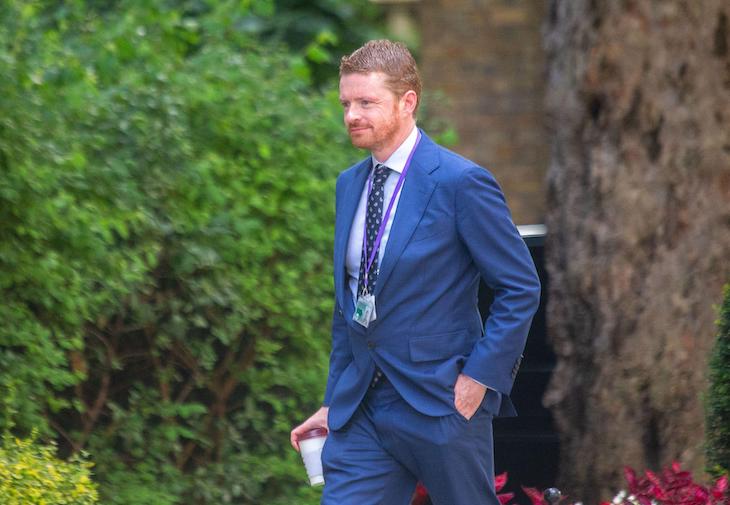It might be best described as the war for Keir Starmer’s ear in Downing Street, a battle to the bitter end between two of the Prime Minister’s most senior advisers. There was, in reality, only going to be one winner, and so it has come to pass. Morgan McSweeney, Keir Starmer’s chief adviser and architect of Labour’s massive general election victory this summer, has been anointed as the PM’s new all-powerful chief of staff. Out goes Sue Gray, his embattled predecessor. Gray decided the game was up, saying she ‘risked becoming a distraction’.
How will he go about ensuring that Whitehall bends to his master’s will?
This is Whitehall-speak for a series of negative briefings behind the scenes and increasingly acrimonious public rows. There was controversy after it was revealed that Gray was being paid £170,000 in the role. It is unknown who leaked her salary details, which showed she was earning more than Starmer. The revelations sparked anger among Labour special advisers who are paid considerably less.
Gray was also accused of hoarding power, and of blocking certain security officials from briefing the PM. The allegations were vociferously denied by No. 10. Behind this lay the real and much bigger battle for control and influence at the heart of Downing Street. This was reflected in tensions between Gray, a former civil servant, and McSweeney, the campaign strategist and ever-present top adviser to the PM. This was a gigantic tussle carried out via seemingly petty means. It has been reported that Gray twice moved McSweeney’s desk further away from the PM’s office. There had also been reports of clashes between Gray and McSweeney’s respective teams over the running of the government machine. Gray’s supporters accused McSweeney’s ‘boys’ of failing to appreciate the complexities of Whitehall and of trying to engineer her removal. All rather unedifying squabbling for an administration that had come to power promising an end to the years of Tory ‘chaos’, and offering ‘change’ and ‘public service’ in its place.
In sealing victory, McSweeney has cemented his position as Starmer’s right-hand man, and is now one of the most powerful figures in Downing Street. His rise is an extraordinary tale. He is a former director of the Starmer-supporting Labour Together think tank, but also a formidable political operator who made his name as a party organiser in London. His earliest role was in the attack and rebuttal unit at Labour headquarters during Tony Blair’s time as PM. He also worked under Peter (now Lord) Mandelson, steadily rising through the ranks, helping to organise Labour victories in marginal seats. He is, in short, no stranger to the darker arts of politics.
This is all well and good, but is McSweeney the answer to the problems in what has been described as a dysfunctional Downing Street operation? Weeks of missteps have seen the government fail to get a grip on the donations and ‘freebies’ row, including from the multimillionaire Labour peer Lord Alli.
The ongoing rows have helped make the Starmer honeymoon period in office short-lived, to say the least. What will McSweeney bring to his new role, and how exactly will he get a grip on the wider operation as chief of staff? These are obvious questions to which there are, as yet, no clear answers.
McSweeney will certainly make the Downing Street machine more ‘political’, which is his forte as a campaigner. But the chief of staff role demands much more than that. McSweeney, for example, has no obvious Whitehall experience and is no match for Gray in that regard. How will he go about ensuring that Whitehall bends to his master’s will? McSweeney also has little in the way of prior experience of policy implementation, often considered a vital prerequisite for any effective chief of staff. He is a campaigner first and foremost, rather than someone steeped in delivering change across Whitehall. It is also worth noting that he has a fair few enemies on the Labour left, which may prove a hindrance when the government hits problems in the future.
More broadly, questions remain about the changing of the deckchairs in Downing Street. The infighting in Downing Street has amounted to a disastrous first 100 days or so for Keir Starmer. As well as a new chief of staff, he made a series of other appointments to his No. 10 staff as he looks to move on from a rocky first three months in power. This includes two new deputy chiefs of staff, a new principal private secretary, and a head of a new ‘strategic communications team’. It is anyone’s guess whether this will bring an end to the donor rows, as well as wider chaos that has enveloped the new government. There is much lofty talk about a ‘reset’, but talk is all it is. It falls to Morgan McSweeney to show he knows how to go about delivering it.








Comments